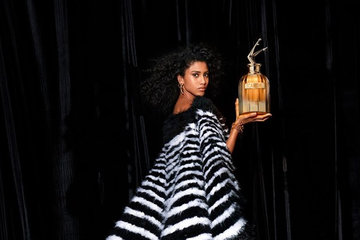Like many children, Omar Kamal learned to play piano as a child. But for him, it was the start of his journey from his home in Nablus all the way to Hollywood. We caught up with the handsome crooner, popularly known as “The Palestinian Frank Sinatra,” to talk about what it’s like to hit the big time.

You've been called "The Palestinian Frank Sinatra." What do you think about that title?
Omar Kamal: I think that this is a great honor especially at this early stage in my career. I've spent years listening to Sinatra and closely observing the Sinatra 'way' of singing, story-telling, phrasing. And for me, not having had any coaching, I do believe that I've learnt from one of the best. Having said that, this title will soon diminish as I start working on my own music and sharing with the world different aspects of my act I've been exploring recently.
What was it like to record your first album?
OK: The recording process was such a unique experience that changed many perspectives for me and widened my horizons. I was fortunate enough to work with celebrated producers Dave Pierce and Bob Rock (who have worked with greats like Michael Buble and Aerosmith). They are two people who absolutely adore music for what it is and love making records and I could relate to that a lot. It was a great journey that started in London and ended at Capitol Studios in Hollywood, and between that, work on this album took place in Las Vegas, Vancouver, and Nablus!

2016 was a big year for you – what is like to suddenly have so much recognition?
OK: Being recognized is the artist's glory. I don't mean fame or money, but recognition for their true art. I'm very thankful for this opportunity and will never take it for granted.
How has your Arab heritage influenced your singing?
OK: Being from an Arabic/Palestinian background made me subconsciously bring a different feel and emotion to some of these great Western songs that I've been fortunate enough to come across. The singing techniques and the musical patterns are admittedly different between the East and West but the spontaneous crossover in the emotion when performing both Arabic and Western songs creates a new fresh sound, which -with time- would develop into an 'artistic identity'.

Would you like to perform in the Gulf?
OK: I would love to perform in the Gulf. We're already in talks about shows in Bahrain, Kuwait and UAE, which is very exciting.
What do you think about music taste in Arab countries?
OK: We're constantly finding out about new music styles in the Middle East and it's always refreshing to experience something new. Saad Lamjarred and his band are delivering a great style that is influenced by their North African heritage as well as Western music.

What advice would you give to Arab youth who want to become singers?
OK: Recognize your strengths and potential and work hard on that, stay true and do it for the love of music, and believe, believe, believe!
What can your fans expect from you in 2017?
OK: We're working on many live opportunities to perform to our audiences in different places and I'm really looking forward to sharing this album journey with everyone. Also we will start working on next steps including some original material both in English and Arabic.

















